人教版英语七年级下册第十二单元短语语法知识点总结
英语七年级下册Unit12【重点短语+词法语法句法精讲】
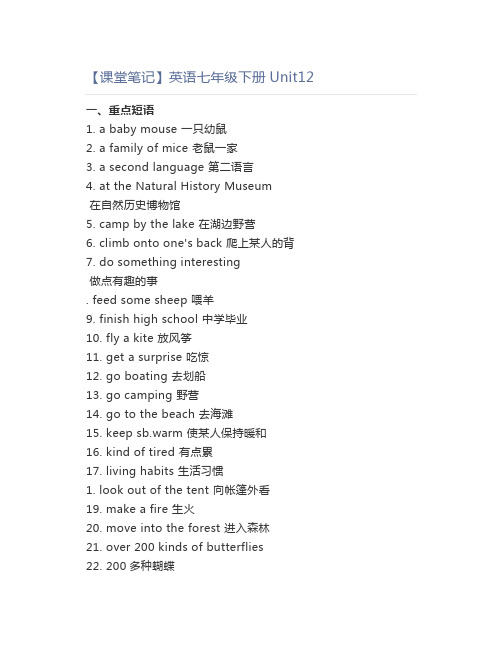
【课堂笔记】英语七年级下册Unit12一、重点短语1. a baby mouse 一只幼鼠2. a family of mice 老鼠一家3. a second language 第二语言4. at the Natural History Museum在自然历史博物馆5. camp by the lake 在湖边野营6. climb onto one's back 爬上某人的背7. do something interesting做点有趣的事. feed some sheep 喂羊9. finish high school 中学毕业10. fly a kite 放风筝11. get a surprise 吃惊12. go boating 去划船13. go camping 野营14. go to the beach 去海滩15. keep sb.warm 使某人保持暖和16. kind of tired 有点累17. living habits 生活习惯1. look out of the tent 向帐篷外看19. make a fire 生火20. move into the forest 进入森林21. over 200 kinds of butterflies22. 200多种蝴蝶23. play badminton 打羽毛球24. put up our tents 搭我们的帐篷25.read a book about history读一本关于历史的书26.run away 跑开27. see an interesting talk show看一个有趣的脱口秀2. shout at sb.冲某人大声叫嚷(带有感情色彩)29. shout to sb.对某人大声喊叫(不带感情色彩)30. sit under the moon 坐在月光下31. start to jump up and down开始跳上跳下32. stay up late 熬夜33. take a long bus ride乘很长时间的公交车34.take us to India 带我们去印度35. two weeks ago 两星期之前36. wake sb.up 叫醒某人37. work as a guide 做导游工作二、重点句型1.I stayed up late to watch the soccer game.我熬夜看足球赛到很晚。
七年级英语下册重点短语:Unit12

Unit 12 Don’t eat in class. ⼀、词组 school rules 学校规章制度 break the rules 违反规章制度 in the hallways 在过道 listen to music 听⾳乐 in the music room 在⾳乐教室⾥ in the dining hall 在餐厅 sports shoes 运动鞋 gym class 体育课 after school 放学后 have to do 不得不做 too many 太多 get up 起床 by ten o’clock ⼗点之前 make dinner 做饭 the children’s palace 少年宫 ⼆、句型 (1)—Don’t arrive late for class. (2)—We can’t listen to music in the hallways,but we can listen to it outside. (3)—What else do you have to do? -- We have to clean the classroom. (4)--Can we wear hats in school? --Yes,we can/ No,we can’t. (5)-Do you have to wear a uniform at school? -Yes,we do /No,we don’t. 重难点精析 祈使句 通常⽤来表⽰命令、请求、禁⽌、建议、警告等语⽓。
它的主语you(听话⼈)通常省略。
其构成通常有以下⼏种形式。
1)Be型(即系动词原型be+表语+其他)。
如:Be quiet,please. 否定句Don’t + be+表语+其他。
如:Don’t be angry. 2)Do型(即系动词原形+宾语+其他)。
如: Open you books,please. 否定句Don’t +实义动词原形+宾语+其他。
人教版七年级英语下册第十二单元知识点归纳

人教版七年级英语下册第十二单元知识点归纳人教版七年级英语下册第十二单元知识点归纳Unit 12 What did you do last weekend?◆短语归纳1. do my homework 做我的家庭作业2. go to cinema 去看电影3. go boating / camping 去划船/ 去野营4. play badminton 打羽毛球5. on Saturday morning 在星期六早上6. work as 以……身份而工作7. have a good weekend 周末过得愉快8. kind of 有点儿9. stay up late 熬夜10. run away 跑开11. shout at 对……大声叫嚷12. fly a kite 放风筝13. high school 中学14. put up 搭起,举起15. in the countryside 在乡下16. get a surprise 吃惊17. makea fire 生火18. each other 互相19. so… that… 如此……以至于……20. go to sleep 入睡21. the next morning 第二天早上22. look out of…向……外看23. shout to 冲……呼喊24. up and down 上上下下25. wake…up 把……弄醒26. move into… 移进……27. a swimming pool 一个游泳池28..by the lake 在湖边29.go to the beach 去海滩30..visit my grandma 看望我奶奶31..study for the English test 为英语测验而学习备考32.the Natural History Museum 自然历史博物馆33. high school 高中,中学34. .tell stories 讲故事35..give back 归还36..be afraid 害怕37..play the guitar 弹吉他38.go to the library 去图书馆◆用法集萃1. go + doing 去做某事2. play + 球类玩……球3. 时间段+ ago ……前4. keep + sb. / sth. + 形容词/ 副词/ 介词短语使……保持……5. so + 形容词/ 副词+ that 句子如此……以至于……6. see sb. doing sth. 看见某人正在做某事7. let sb. do sth. 让某人做某事8. start to do / doing sth. 开始做某事◆典句必背1. —What did you do last weekend? 上个周末你做什么了?I did my homework. / We went boating. 我做了我的家庭作业。
人教版七年级英语下册Unit12知识点归纳

Unit12 What did you do last weekend?知识点归纳一、重点短语1. last weekend 上周末2. do one’s homework 做作业3. go to the cinema 看电影4. go boating 去划船5. camp by the lake 在湖边露营6. go to the beach 去海滩7. play badminton 打羽毛球8. on Saturday morning 在周六的早上9. study for the English test 为了英语考试学习10. feed some cows 喂一些奶牛11. work as a guide 做为一个导游工作12. Natural History Museum 自然历史博物馆13. butterfly house 蝴蝶馆14. over 200 kinds of butterflies 超过200多种蝴蝶15. tell sb about … 告诉某人关于…16. living habits 生活习惯17. be kind of tired 有点儿累19. stay up 熬夜20. play with sb. 和某人玩21. lose things 丢东西22. run away 跑开23. fly a kite 放风筝24.as a special gift 作为一个特殊的礼物25. take sb. to sp. 把某人带到某地26. go camping 去露营27. put up the tents 搭建帐篷28. make a fire 生火29. keep sb. warm 使某人保持温暖30. on the first night 在第一天晚上31.so...that... 如此…以至于…32. go to sleep 去睡觉33. get a surprise 吃惊34. see sb. doing sth. 看见某人正在做某事35. jump up and down 上蹦下跳36. climb onto one’s back 爬到某人背上37. shout at/shout to 大声喊叫38 wake …up 把...弄醒39. move into… 移入,爬进…中40. a useful lesson 有用的一课二、用法归纳1. go + doing 去做某事2. play + 球类玩……球3. 时间段+ ago ……前4. keep + sb. / sth. + 形容词/ 副词/ 介词短语使……保持……5. so + 形容词/ 副词+ that 句子如此……以至于……6. see sb. doing sth. 看见某人正在做某事7. let sb. do sth. 让某人做某事8. start to do / doing sth. 开始做某事三、重点句子1. —What did you do last weekend? 上个周末你做什么了?—I did my homework. / We went boating. 我做了我的家庭作业。
人教版七年级下册英语Unit 12 知识点语法归纳总结
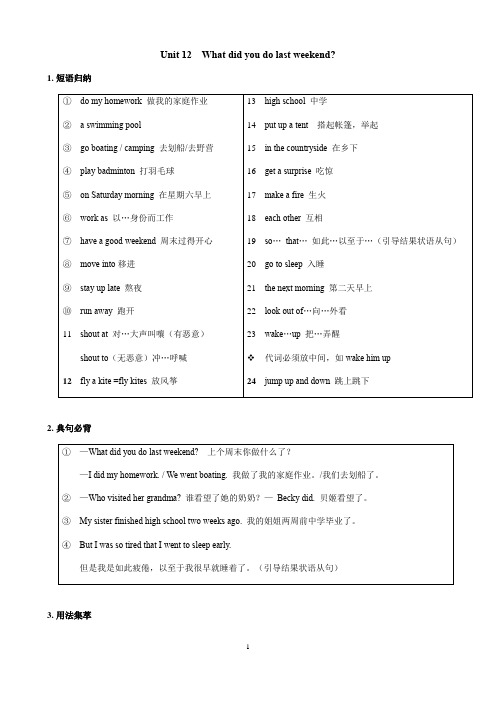
Unit 12 What did you do last weekend?1.短语归纳2.典句必背3.用法集萃(1)What did you do last weekend? 你上周末做了什么?❖last 作形容词时,意为“最后的,最末的”或者“紧接前面的,刚过去的”。
例如:Today is the last day in the year. 今天是今年的最后一天。
I didn’t sleep well last night. 昨晚我没睡好。
❖last作副词时,意为“最后地”,例如:I’m the last one. 我是最后一个。
❖last 做动词时,意思是“持续,继续,维持”等,例如:The hot weather lasted a week. 炎热的天气持续了一周。
(2)How interesting! 多有趣啊!❖本句是how引导的感叹句,how用来修饰形容词或副词,此类感叹句的结构为:“How+形容词/副词( +主语+谓语)!”。
例:How beautiful the girl is! 这个女孩真漂亮啊!How fast the boy is running ! 那个男孩跑得真快啊!❖what也可以引导感叹句,what用来修饰名词。
常见的结构有:(3)I stayed up late to watch the soccer game. 我熬夜到很晚看了足球赛。
❖stay up是固定搭配,意为“熬夜”。
例:She stayed up until 2 :00 am. 她熬夜熬到凌晨两点。
❖常见的“动词+up”结构的短语还有:(4)The cat quickly ran away. 那只猫飞快地逃跑了。
❖run away意为“逃跑;跑开”,其中run意为“跑”,过去式是ran,属于不规则变化。
例:The thief tried to run away, but he failed. 那个小偷试图逃跑,但失败了。
最全面人教版七年级下册英语第十二单元知识点归纳总结
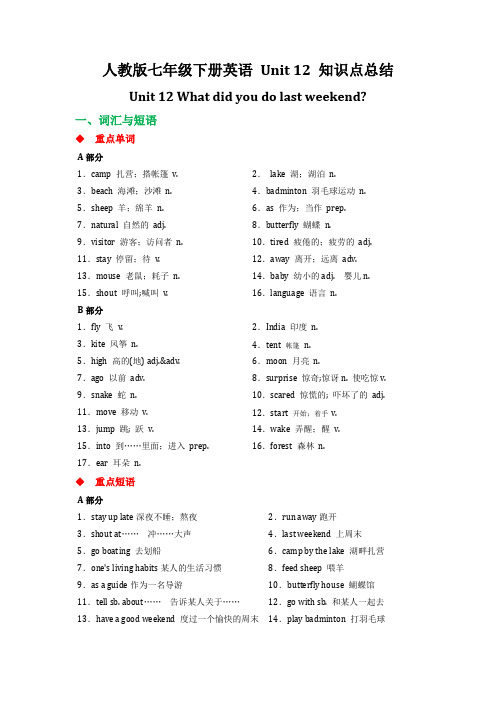
人教版七年级下册英语Unit 12 知识点总结Unit 12 What did you do last weekend? 一、词汇与短语◆重点单词A部分1.camp 扎营;搭帐篷v.2.lake 湖;湖泊n.3.beach 海滩;沙滩n.4.badminton 羽毛球运动n. 5.sheep 羊;绵羊n.6.as 作为;当作prep. 7.natural 自然的adj.8.butterfly 蝴蝶n.9.visitor 游客;访问者n.10.tired 疲倦的;疲劳的adj. 11.stay 停留;待v.12.away 离开;远离adv. 13.mouse 老鼠;耗子n.14.baby 幼小的adj. 婴儿n. 15.shout 呼叫;喊叫v.16.language 语言n.B部分1.fly 飞v.2.India 印度n.3.kite 风筝n.4.tent 帐篷n.5.high 高的(地) adj.&adv.6.moon 月亮n.7.ago 以前adv.8.surprise 惊奇;惊讶n. 使吃惊v. 9.snake 蛇n.10.scared 惊慌的; 吓坏了的adj. 11.move 移动v.12.start 开始;着手v.13.jump 跳; 跃v.14.wake 弄醒;醒v.15.into 到……里面;进入prep.16.forest 森林n.17.ear 耳朵n.◆重点短语A部分1.stay up late深夜不睡;熬夜2.run away跑开3.shout at……冲……大声4.last weekend 上周末5.go boating 去划船6.camp by the lake 湖畔扎营7.one's living habits某人的生活习惯8.feed sheep 喂羊9.as a guide作为一名导游10.butterfly house 蝴蝶馆11.tell sb. about……告诉某人关于……12.go with sb. 和某人一起去13.have a good weekend 度过一个愉快的周末14.play badminton 打羽毛球B部分1.fly a kite 放风筝2.high school 中学3.put up 搭起;举起4.each other 互相;彼此5.get a surprise 吃惊6.shout to……对……大声喊叫7.up and down 上上下下;起伏8.wake……up 把……弄醒9.a special gift 一件特殊的礼物10.take a long bus ride to 乘长途车去11.put up 搭起;举起12.keep sb. warm 使某人暖和13.on the first night 在第一个夜晚14.tell a story 讲故事15.go to sleep 入睡,睡着16.look out of 朝外看17.read a book about…读关于…的书18.know about 知道关于19.start to do sth. 开始做某事20.jump up and down 跳上跳下21.move into 搬进22.make a fire 生火23.something interesting 有趣的事情24.feel……doing sth. 觉得……正在做某事25.finish high school 高中毕业26.see……doing sth. 看见……正在做某事27.clean one's room 打扫房间28.so……that……如此……以至于……29.on Saturday night 在周六晚上30.have dinner with sb.和某人一起吃晚饭31.stay at home 待在家里32.have a busy weekend度过一个繁忙的周末33.talk show 脱口秀34.study for……为……学习◆重点句子A部分1.—What did you do last weekend? 上个周末你做什么了?—I did my homework. 我做我的家庭作业了。
人教版七年级下册英语Unit12单元语法知识点总结

人教版七年级下册英语Unit12单元语法知识点总结本单元重点短语的具体用法1. Last weekend:用于描述过去的时间,通常在句子中作时间状语。
例如:I went shopping last weekend.(我上周末去购物了。
)2. Do one's homework:表示做作业。
例如:I need to do my homework before going out.(我需要在出去之前做作业。
)3. Go to the cinema:去看电影。
例如:They decided to go to the cinema instead of staying at home.(他们决定去电影院而不是待在家里。
)4. Go boating:去划船。
例如:We went boating on the lake and had a great time.(我们在湖上划船,玩得很开心。
)5. Camp by the lake:在湖边露营。
例如:They camped by the lake and enjoyed the beautiful scenery.(他们在湖边露营,欣赏美丽的风景。
)6. Go to the beach:去海滩。
例如:I like to go to the beach to relax.(我喜欢去海滩放松。
)7. Play badminton:打羽毛球。
例如:They played badminton in the park.(他们在公园里打羽毛球。
)8. On Saturday morning:在周六的早上。
例如:On Saturday morning, I usually sleep in.(在周六的早上,我通常会睡懒觉。
)9. Study for the English test:为英语考试学习。
例如:I have to study for the English test tomorrow.(我必须为明天的英语考试学习。
Unit12知识归纳人教版七年级英语下册
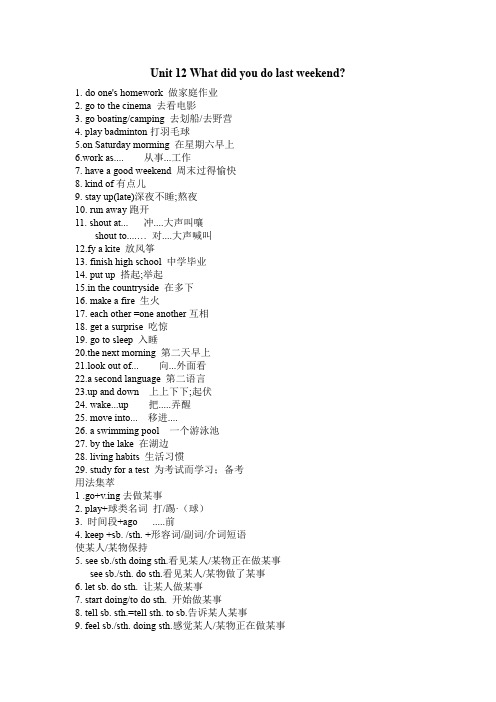
Unit 12 What did you do last weekend?1.do one's homework 做家庭作业2. go to the cinema 去看电影3. go boating/camping 去划船/去野营4. play badminton打羽毛球5.on Saturday morming 在星期六早上6.work as.... 从事...工作7. have a good weekend 周末过得愉快8. kind of有点儿9. stay up(late)深夜不睡;熬夜10. run away跑开11. shout at... 冲....大声叫嚷shout to....… 对....大声喊叫12.fy a kite 放风筝13. finish high school 中学毕业14. put up 搭起;举起15.in the countryside 在多下16. make a fire 生火17. each other =one another互相18. get a surprise 吃惊19. go to sleep 入睡20.the next morning 第二天早上21.look out of... 向...外面看22.a second language 第二语言23.up and down 上上下下;起伏24. wake...up 把.....弄醒25. move into... 移进....26. a swimming pool 一个游泳池27. by the lake 在湖边28. living habits 生活习惯29. study for a test 为考试而学习;备考用法集萃1 .go+v.ing去做某事2. play+球类名词打/踢·(球)3. 时间段+ago .....前4. keep +sb. /sth. +形容词/副词/介词短语使某人/某物保持5.see sb./sth doing sth.看见某人/某物正在做某事see sb./sth. do sth.看见某人/某物做了某事6. let sb. do sth. 让某人做某事7. start doing/to do sth. 开始做某事8. tell sb. sth.=tell sth. to sb.告诉某人某事9. feel sb./sth. doing sth.感觉某人/某物正在做某事feel sb./sth. do sth.感觉某人/某物做了某事10. so+形容词/副词+that.....如此......以至于......11.感叹句①How+ adj./adv.(+主语+谓语+其他)!① What(+ a/an)+ adj. +名词(+主语+谓语+其他)!作文范文:A Busy WeekendI had a busy weekend last week. I spent lots of time doing my homework on Saturday morning. Then I cooked lunch. After lunch, I went shopping and bought lots of food and drinks because it was my birthday the next day. In the evening, my parents and I went to the movies. On Sunday I got up early and cooked breakfast. I went for a picnic with my friends and enjoyed ourselves. In the afternoon, I went to the library and read some interesting books. I listened to some music and watched talk show on TV in the evening. Time passed quickly and I really had a busy but happy weekend.语法填空:1.I can feel the train (move) now.2.The old man (sit) here ten minutes ago.3.This was useful lesson for me.4.They went (camp) last weekend.5.There are a lot of (visit) in Beijing every year.6.They talked about their (live) habits.7.Some (mouse) were in the kitchen.8.(arrive) at school on time, you must get up early.9.There are many (sheep) on the farm.10.I was tired that I went to sleep early.11.You must learn how (call) the fire station.12.I satyed late to watch a soccer game.13. a beautiful girl she is!14.We camped the lake two days ago.15.I worked a guide at the history museum.16.Let me (help) you.17.We started (put) up tents.18.The snake moved the forest.19.Did you (finish) your homework last night?20.It is important (learn) a second language.。
Unit 12 单元知识点总结 七年级英语下册(人教版)
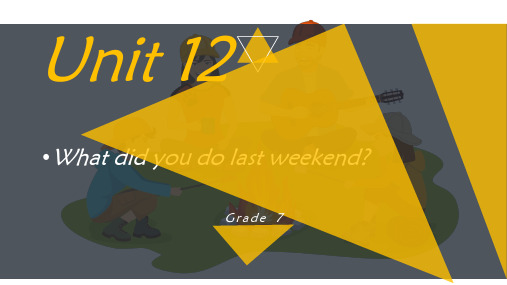
3.当我看到考试分数时,我吃了一惊。
I __g_o_t____a___s_u_r_p_r_is_e_______ when I saw the grades of the exams.
4.你能教我怎样搭这个帐篷吗?
Can you teach me ____h_o_w____to____p_u_t____u_p___ the tent?
C.How nice a
D.What nice a
4.__________money we have! We can’t even afford a piece of bread.
A.What little
B.How little
C.What a little
5.__________good book! It’s so helpful to us.
02
词汇专题
natural, tired, surprising…
2.1 sheep
“绵羊” 可数名词 (单复同形)
I bought a sheep just now. So I have five sheep now.
2.2 natural
natural
adj. 自然的
Our city has a good natural environment.
run away 抛开,逃跑 She gave me a book and ran away quickly.
That’s why… 那是为什么…
That’s why I come here.
a second language 第二语言
English is often used as a second language.
人教版英语七年级下册第十二单元短语语法知识点总结 (优选.)
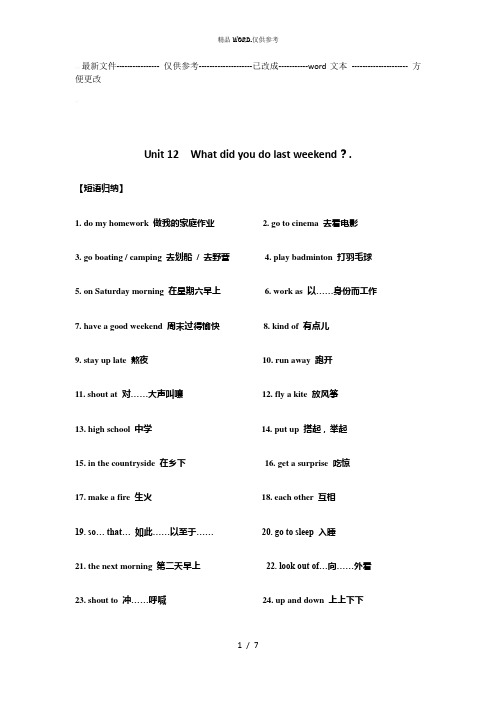
wo最新文件---------------- 仅供参考--------------------已改成-----------word文本--------------------- 方便更改rdUnit 12What did you do last weekend?.【短语归纳】1. do my homework 做我的家庭作业2. go to cinema 去看电影3. go boating / camping 去划船/ 去野营4. play badminton 打羽毛球5. on Saturday morning 在星期六早上6. work as 以……身份而工作7. have a good weekend 周末过得愉快8. kind of 有点儿9. stay up late 熬夜10. run away 跑开11. shout at 对……大声叫嚷12. fly a kite 放风筝13. high school 中学14. put up 搭起,举起15. in the countryside 在乡下16. get a surprise 吃惊17. make a fire 生火18. each other 互相19. so… that… 如此……以至于…… 20. go to sleep 入睡21. the next morning 第二天早上22. look out of…向……外看23. shout to 冲……呼喊24. up and down 上上下下25. wake…up 把……弄醒26. move into… 移进……【用法集萃】1. go + doing 去做某事2. play + 球类玩……球3. 时间段+ ago ……前4. keep + sb. / sth. + 形容词/ 副词/ 介词短语使……保持……5. so + 形容词/ 副词+ that 句子如此……以至于……6. see sb. doing sth. 看见某人正在做某事7. let sb. do sth. 让某人做某事8. start to do / doing sth. 开始做某事┃语法探究┃Ⅰ.一般过去时态Ⅱ谓语动词为be:肯定句:主语+was/were +其他.否定句:主语+was/were +not +其他.一般疑问句:Was/Were +主语+其他?两种回答:Yes,…was;No,…wasn't.特殊疑问句:特殊疑问词+was/were +主语+其他?谓语动词为实义动词:肯定句:主语+过去式+其他.否定句:主语+didn't +动词原形+其他.一般疑问句:Did +主语+动词原形+其他?两种回答:Yes, … did; No,… didn't.特殊疑问句:特殊疑问词+did +主语+动词原形+其他?如:My weekend was pretty good.→My weekend wasn't pretty good.→Was your weekend pretty good?→Yes, it was; No, it wasn't.→How was your weekend?She went to Beijing last week.→She didn't go to Beijing last week.→Did she go to Beijing last week?→Yes, she did; No, she didn't.→Who went to Beijing last week?→Where did she go last week?→When did she go to Beijing?Ⅱ.感叹句感叹句通常由what, how引导,表示赞美、惊叹、喜悦等感情。
人教版七年级英语下册Unit 12重点短语、语法汇总
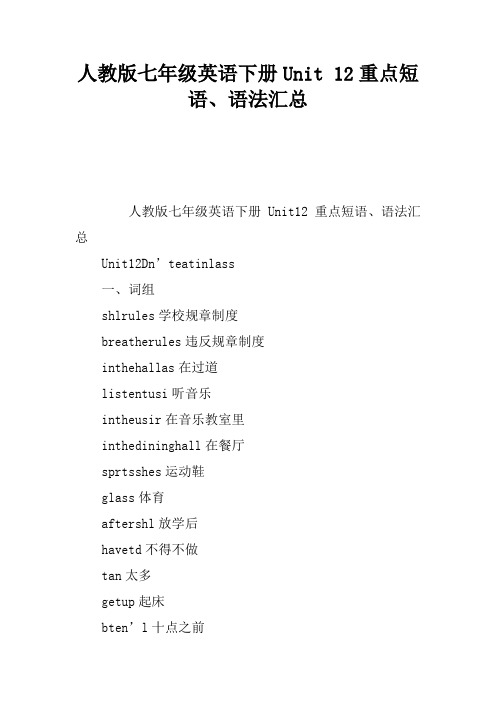
人教版七年级英语下册Unit 12重点短语、语法汇总人教版七年级英语下册Unit12重点短语、语法汇总Unit12Dn’teatinlass一、词组shlrules学校规章制度breatherules违反规章制度inthehallas在过道listentusi听音乐intheusir在音乐教室里inthedininghall在餐厅sprtsshes运动鞋glass体育aftershl放学后havetd不得不做tan太多getup起床bten’l十点之前aedinner做饭thehildren’spalae少年宫二、句型—Dn’tarrivelatefrlass—ean’tlistentusiinthehallas,buteanlistentitutside —hatelseduhavetd?--ehavetleanthelassr--aneearhatsinshl?--es,ean/N,ean’t-Duhavetearaunifratshl?-es,ed/N,edn’t重难点精析祈使句通常用来表示命令、请求、禁止、建议、警告等语气。
它的主语u通常省略。
其构成通常有以下几种形式。
1)Be型(即系动词原型be+表语+其他)。
如:Bequiet,please否定句Dn’t+be+表语+其他。
如:Dn’tbeangr2)D型(即系动词原形+宾语+其他)。
如:penubs,please否定句Dn’t+实义动词原形+宾语+其他。
如:Dn’teatinthelassr3)Let型(即Let+宾语+动词原形+其他)如:LetehelpuLet’sgatsix’l否定句一般在宾语后加nt。
如:Let’ntathTV4)N+V-ing型(此种形式通常用于公共场合的提示语中,意为“禁止做某事“)如:Nsing!严禁吸烟!Ntaling!不许交谈!Npassing!禁止通行!Nparing!不许停车。
人教版七年级英语下册Unit12重点短语、语法汇总

.精品文档.人教版七年级英语下册Unit12重点短语、语法汇总人教版七年级英语下册Unit 12重点短语、语法汇总Unit 12 Dn ' t eat in lass.一、词组shl rules 学校规制度break the rules 违反规制度in the hallways 在过道listen t usi 听音乐in the usi r 在音乐教室里in the dining hall 在餐厅sprts shes 运动鞋gy lass 体育课after shl 放学后have t d 不得不做t any 太多get up 起床by ten ' lk十点之前ake dinner 做饭the hildren ' s palae 少年宫二、句型.精品文档.⑴一Dn‘ t arrive late fr lass.(2) —e an ' t listen t usi in the hallways,but wean listen t it utside.(3) —hat else d yu have t d?--e have t lean the lassr.(4) --an we wear hats in shl?--yes,we an/ N,we an ' t.(5) -D yu have t wear a unifr at shl?-yes,we d /N,we dn ' t.重难点精析祈使句通常用表示命令、请求、禁止、建议、警告等语气。
它的主语yu(听话人)通常省略。
其构成通常有以下几种形式。
1) Be型(即系动词原型be+表语+其他)。
女口:Be quiet,please.否定句Dn' t + be+表语+其他。
女口:Dn' t be angry.2) D型(即系动词原形+宾语+其他)。
如:pen yu bks,please.否定句Dn' t +实义动词原形+宾语+其他。
Unit12单词短语句型知识点总结人教版英语七年级下册
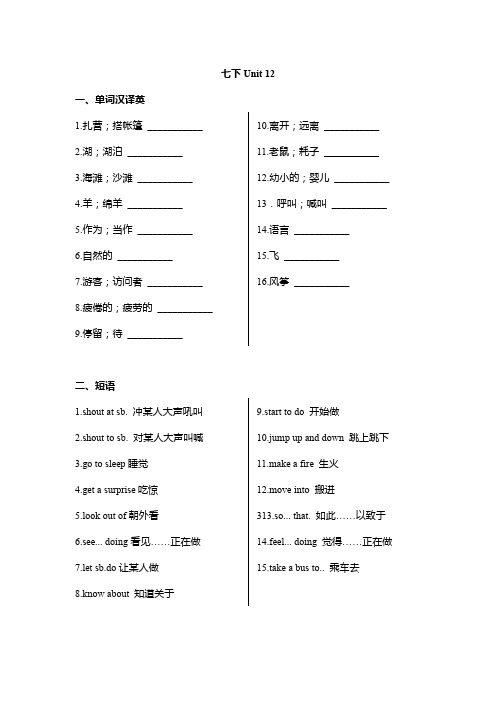
七下Unit 12一、单词汉译英1.扎营;搭帐篷___________2.湖;湖泊___________3.海滩;沙滩___________4.羊;绵羊___________5.作为;当作___________6.自然的___________7.游客;访问者___________8.疲倦的;疲劳的___________9.停留;待___________ 10.离开;远离___________11.老鼠;耗子___________12.幼小的;婴儿___________ 13.呼叫;喊叫___________14.语言___________15.飞___________16.风筝___________二、短语1.shout at sb. 冲某人大声吼叫2.shout to sb. 对某人大声叫喊3.go to sleep睡觉4.get a surprise吃惊5.look out of朝外看6.see... doing看见……正在做7.let sb.do让某人做8.know about 知道关于9.start to do 开始做10.jump up and down 跳上跳下11.make a fire 生火12.move into 搬进313.so... that. 如此……以致于14.feel... doing 觉得……正在做15.take a bus to.. 乘车去三、句型1. 我老爸后来告诉我,蛇没有耳朵,但能感觉到物体的移动。
My dad told me later that snakes don’t have ears but can feel things moving.2. 他也告诉我不要接近蛇很重要。
He also told me it was important not to go near a snake.3. 对于我来说,这是一次非常有用的教训。
This was a very useful lesson for me.4. 大家周末都过得好吗Did everyone have a good weekend?5. 这样就把蛇弄醒了,它爬进了湖边的森林里。
七年级下册英语第十二单元笔记
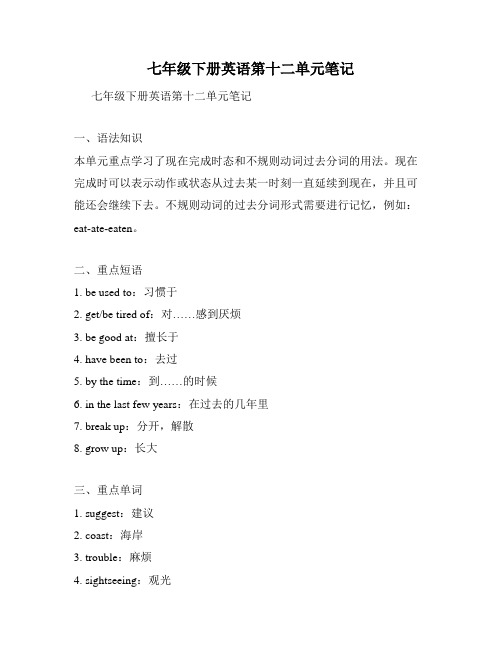
七年级下册英语第十二单元笔记七年级下册英语第十二单元笔记一、语法知识本单元重点学习了现在完成时态和不规则动词过去分词的用法。
现在完成时可以表示动作或状态从过去某一时刻一直延续到现在,并且可能还会继续下去。
不规则动词的过去分词形式需要进行记忆,例如:eat-ate-eaten。
二、重点短语1. be used to:习惯于2. get/be tired of:对……感到厌烦3. be good at:擅长于4. have been to:去过5. by the time:到……的时候6. in the last few years:在过去的几年里7. break up:分开,解散8. grow up:长大三、重点单词1. suggest:建议2. coast:海岸3. trouble:麻烦4. sightseeing:观光5. onion:洋葱6. grill:烤7. waitress:女服务员8. reservation:预定四、范文Last weekend, I traveled to a coastal city with my family. We had a great time there and I would like to share some experience and feelings with you in this note.We arrived in the city on Friday evening. By the time we checked into the hotel, it was already dark. However, we decided to go to the beach for a walk. It was my first time to visit a coastal city, and I was amazed by the view of the beach at night. The sound of waves, the smell of the sea, and the stars in the sky made me feel like I was in a different world.The next day, we started our sightseeing journey. We went to a famous seafood restaurant for lunch. The waitress suggested that we try the grilled fish and onion rings. It turned out to be really delicious. After lunch, we went to a nearby museum, where we learned a lot about the history of the city and its people. In the evening, we had a reservation at a fancy restaurant. We dressed up and enjoyed a great meal while watching the sunset.On Sunday, we decided to rent a car and drive along the coast. We stopped at several beautiful beaches and took a lot of photos. I was surprised by how clear the water was and how white the sand was. We also visited a smallfishing village and learned how the local people make a living by fishing.All in all, it was a wonderful trip. I am so glad that I have been to this beautiful city and I am looking forward to going there again in the future.。
人教七下英语Unit 12 单元重点语法
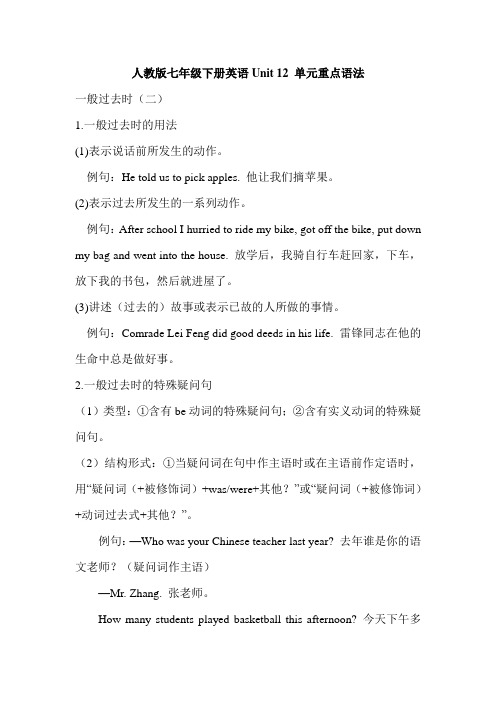
人教版七年级下册英语Unit 12 单元重点语法一般过去时(二)1.一般过去时的用法(1)表示说话前所发生的动作。
例句:He told us to pick apples. 他让我们摘苹果。
(2)表示过去所发生的一系列动作。
例句:After school I hurried to ride my bike, got off the bike, put down my bag and went into the house. 放学后,我骑自行车赶回家,下车,放下我的书包,然后就进屋了。
(3)讲述(过去的)故事或表示已故的人所做的事情。
例句:Comrade Lei Feng did good deeds in his life. 雷锋同志在他的生命中总是做好事。
2.一般过去时的特殊疑问句(1)类型:①含有be动词的特殊疑问句;②含有实义动词的特殊疑问句。
(2)结构形式:①当疑问词在句中作主语时或在主语前作定语时,用“疑问词(+被修饰词)+was/were+其他?”或“疑问词(+被修饰词)+动词过去式+其他?”。
例句:—Who was your Chinese teacher last year? 去年谁是你的语文老师?(疑问词作主语)—Mr. Zhang. 张老师。
How many students played basketball this afternoon? 今天下午多少学生打篮球了?(疑问词作主语前面的定语)。
(1)对主语提问或对主语的定语提问时,后面句序应为陈述句语序。
(2)当疑问词作宾语或状语时,用“疑问词+was/were+主语+其他?”或“疑问词+did+主语+动词原形+其他?”。
例句:—When was he in Shanghai? 他何时在上海的?—Yesterday morning.昨天上午。
在否定句和疑问句中,如果出现了助动词did,后面的谓语动词应还原为原形。
3.一般过去时的时间状语一般过去时常与一些表示过去时间的状语连用。
初一英语下册(人教版)第12单元重点语法

初一英语下册(人教版)第12单元重点语法1, go camping 去露营Let’s go camping 让我们一起去露营2, stay away from 远离You must stay away from smoking 你必须远离吸烟3, shout at 对某人大叫(有恶意)Don’t shout at me 不要对我大叫4, shout to 向。
叫去He is shouting to the building 他向这个大厦大叫。
5,to one’s surprise 令某人吃惊To my surprise ,He got 100 in his English test 令我吃惊的是,他在英语考试中得了100分6, wake up 醒来I wake up early 我醒来很早7, start to do sth 开始做某事。
Start doing sth 开始从事某事I start to read books 我开始阅读I started playing the piano at the age of six我在六岁的时候开始弹钢琴8, work for 为。
工作, work as 工作作为I am working for a school 我在一个学校工作I work as a teacher 我工作作为一个老师9, run away 逃跑, run out of 用尽= use upDon’t run away 不要逃跑I can run out of my money 我不能用尽我的钱=I can’t use up my money10,take 。
to。
把。
带到。
,bring 。
from。
从。
带。
I can take you to school 我能带你去学校I can bring a book from my school 我能从我的学校带来一本书11, look out of 向外面望去He is looking out of the window 他正在向窗外望12, see sb do sth(全过程)=see sb doing sth(过程的一部分)看见某人做某事I saw him play football yesterday 昨天我看见他踢足球。
- 1、下载文档前请自行甄别文档内容的完整性,平台不提供额外的编辑、内容补充、找答案等附加服务。
- 2、"仅部分预览"的文档,不可在线预览部分如存在完整性等问题,可反馈申请退款(可完整预览的文档不适用该条件!)。
- 3、如文档侵犯您的权益,请联系客服反馈,我们会尽快为您处理(人工客服工作时间:9:00-18:30)。
U n i t12W h a t d i d y o u d o l a s t w e e k e n d?. 【短语归纳】1. do my homework 做我的家庭作业2. go to cinema 去看电影3. go boating / camping 去划船/ 去野营4. play badminton 打羽毛球5. on Saturday morning 在星期六早上6. work as 以……身份而工作7. have a good weekend 周末过得愉快8. kind of 有点儿9. stay up late 熬夜10. run away 跑开11. shout at 对……大声叫嚷12. fly a kite 放风筝13. high school 中学14. put up 搭起,举起15. in the countryside 在乡下16. get a surprise 吃惊17. make a fire 生火18. each other 互相19. so… that… 如此……以至于…… 20. go to sleep 入睡21. the next morning 第二天早上22. look out of…向……外看23. shout to 冲……呼喊24. up and down 上上下下25. wake…up 把……弄醒26. move into… 移进……【用法集萃】1. go + doing 去做某事2. play + 球类玩……球3. 时间段+ ago ……前4. keep + sb. / sth. + 形容词/ 副词/ 介词短语使……保持……5. so + 形容词/ 副词+ that 句子如此……以至于……6. see sb. doing sth. 看见某人正在做某事7. let sb. do sth. 让某人做某事8. start to do / doing sth. 开始做某事┃语法探究┃Ⅰ.一般过去时态Ⅱ谓语动词为be:肯定句:主语+was/were +其他.否定句:主语+was/were +not +其他.一般疑问句:Was/Were +主语+其他?两种回答:Yes,…was;No,…wasn't.特殊疑问句:特殊疑问词+was/were +主语+其他?谓语动词为实义动词:肯定句:主语+过去式+其他.否定句:主语+didn't +动词原形+其他.一般疑问句:Did +主语+动词原形+其他?两种回答:Yes, … did; No,… didn't.特殊疑问句:特殊疑问词+did +主语+动词原形+其他?如:My weekend was pretty good.→My weekend wasn't pretty good.→Was your weekend pretty good?→Yes, it was; No, it wasn't.→How was your weekend?She went to Beijing last week.→She didn't go to Beijing last week.→Did she go to Beijing last week?→Yes, she did; No, she didn't.→Who went to Beijing last week?→Where did she go last week?→When did she go to Beijing?Ⅱ.感叹句感叹句通常由what, how引导,表示赞美、惊叹、喜悦等感情。
what修饰名词,how 修饰形容词、副词或动词。
感叹句结构:1.What +名词+陈述语序.What +a+形容词+名词+陈述语序.What +形容词+复数名词+陈述语序.What +形容词+不可数名词+陈述语序.2.How +形容词+a/an +名词+陈述语序.How+形容词或副词+陈述语序.如:What noise they are making! What a clever boy he is!What wonderful ideas (we have)! What cold weather it is!How clever a boy he is! How lovely the baby is!单项选择( ) 1. I _____ my room last night. A. clean B. cleans C. cleaned( ) 2. He _____ his homework on Sunday morning. A. do B. did C. to do ( ) 3. It is time _____ home. A. go B. to go C. to go to( ) 4. What _____ you _____ last weekend? A. did; do B. did; did C. do; does ( ) 5. ___ he ____ tennis after classes yesterday? A. Did; played B. Did; play C. Does; play 用括号内所给单词的适当形式填空1. Did Carol ______ (camp) with us?2. Let’s go ______ (boat) next.3. We like playing ______ (beach) volleyball.4. They ______ (play) badminton yesterday morning.5. I ______ (not hear) from her last week.根据句意及首字母提示填空1. Don’t c_____ under the tree. It’s not safe.2. The children like swimming in the l______.3. The Super Dan is a great b______ player.4. Did you go to the b______ yesterday?5. I like playing games o______ Sunday morning.对下列句子中的划线部分提问1.I got up at nine yesterday morning. _____ ______ you get up yesterday morning?2. We did our homework last night. ______ ______ you _______ last night?3.They were in the supermarket last Sunday. ______ _______ they last Sunday?4.My last weekend was kind of boring. ______ _____ your last weekend?5.Lin took a walk with her parents after dinner. ___ ___ Lin take a walk with after dinner?┃能力提升训练┃Ⅰ.完形填空Dear Linda,Thanks for your email. I had a busy weekend.On ________ morning, I got up late. At eleven o'clock, I went shopping at a ________. Then I went ________ at the local swimming pool. After that, I cooked lunch and then ________ the house. In the evening, I went out ________ a restaurant with my friends. We ________ a nice dinner and talked a lot.On Sunday morning, I ________ got up late. After breakfast, I went swimming again for some ________ exercise. In the afternoon, I _______ my grandparents. In the evening, I had dinner and watched TV. Then I a book in bed.How was your last weekend?Yours,Ruth( )1. A. Thursday B. Friday C.Saturday D. Monday( )2. A. hospital B. supermarket C. library D. school( )3. A. shopping B. fishing C. swimming D. hiking( )4. A. looked B. cleaned C. played D. stayed( )5. A. to B. at C. for D. in( )6. A. cooked B. called C. had D. made( )7. A. only B. really C. also D. just( )8. A. more B. little C. great D. few( )9. A. wanted B. visited C. asked D. looked( )10. A. did B. had C. read D. studiedⅡ. 阅读理解Mr. King is a reporter. He works for a magazine. He had a very busy weekend. On Saturday morning, he went shopping. On the way, he met Barry—one of his friends. Barry is a waiter. He works in a noodle house. In the afternoon, he cleaned his room. In the evening, he went to a movie. On Sunday morning, he first visited his friend Mona.Mona is a teacher. Then he went to a party. In the afternoon, he went to the City Library. In the evening, he had dinner with his parents in a restaurant. After he got home, he played computer games for two hours. He went to bed at ten o'clock.( )1.Mr. King ________ on Saturday morning.A. went shoppingB. went swimmingC. met his parentsD. cleaned his room ( )2.What is Barry?A. A reporter.B. A waiter.C. An actor.D. A teacher. ( )3.When did Mr. King visit Mona?A. On Saturday morning.B. On Saturday afternoon.C. On Sunday evening.D. On Sunday morning.( )4. What did Mr. King do on Sunday afternoon?A. He went to a movie.B. He went to a party.C. He went to the City Library.D. He had dinner with his parents.( )5. Which of the following is NOT true?A. Mr. King's weekend was busy.B. Barry works in a noodle house.C. On Saturday evening, Mr. King had dinner with his parents.D. Before going to bed, Mr. King played computer games on Sunday.。
